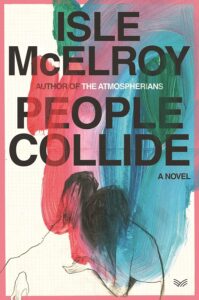In a country of unpredictable roving “man hordes” reported to have “mowed twenty-six lawns in Drain, Illinois” and “kicked a German shepherd to death in Plano, Texas,” a canceled feminist internet influencer, undone by a misogynist troll, and her effeminate, fat-shamed childhood friend seek redemption, revenge, and a better world by establishing a for-profit retreat and atonement regimen to help men “become human.”

This is the premise of Brooklyn-based nonbinary writer Isle McElroy’s 2021 debut novel The Atmospherians, an incisive, hilarious, and discomfiting probe “into the dark heart of wellness and wokeness.”
The project of the novel’s damaged protagonists to cleanse toxic masculinity by creating “a community where men could step out of the spotlight” and be content “to provide the atmosphere, like extras in a movie,” devolves into a literally poisonous cultic empire, headquartered in a decommissioned megamall in New Jersey. On the way to this wry denouement, McElroy’s narrative treats readers to some delightful stylistic and episodic detours, including a visit to the Silicon Valley incubator of “a Revolutionary Web Browser Extension That Guarantees Users Preventive Atonement” by algorithmic analysis of the potential offensiveness of their social media posts to every conceivable constituency, and a periodically updated list of “what the men needed to know” (“Your father’s generation was not great”; “Top Gun is a terrible movie”; “No, you could not have gone pro if your knee didn’t give out in high school”).
Human identity, in McElroy’s fiction, is complicated, volatile, permeable, performative, and above all relational. People Collide, a second novel published this month by McElroy, advances the author’s bold and brilliant exploration of identity’s complexity. McElroy will discuss their new work at 1:30 p.m. on Saturday, Sept. 30 in a presentation on speculative and experimental writing with memoirist Sabrina Imbler that is part of the Provincetown Book Festival.

The narrator of The Atmospherians, Sasha Marcus, is a wronged feminist turned authoritarian leader of a cult of self-mortifying men who, even at their most unregenerate, are more hapless than menacing. Eli, the narrator of People Collide, is (at first) male haplessness personified. Less smart, less attractive, less cultured, less accomplished, less ambitious, less articulate, and less sensitive to the world around him than his high-powered wife, Elizabeth, who informs him when they are introduced that even his name fits neatly inside of hers, Eli tags along on her government travel fellowship to disseminate American culture in Bulgaria. One afternoon in Sofia, however, in a mysterious event that he refers to as “The Incident,” Eli discovers that his body has suddenly become Elizabeth’s and that she, presumably now inhabiting his, has disappeared.
As he searches for his wife, Eli scrambles to perform as Elizabeth with their Bulgarian acquaintances and in phone conversations and subsequent embodied encounters with both her parents and his. He also attends to — and sometimes delights in — the different limits, needs, and possibilities of her/his body and wrestles with new ethical dilemmas, such as whether masturbating would be “to objectify Elizabeth from inside her own body. Did I need her permission to finger her as her?”
A credit card charge leads Eli to Paris, where he finds Elizabeth in the body that was his. Their sexual reunion in an out-of-order men’s room in the Centre Pompidou is, in McElroy’s rendering, a virtuoso symphony of misaligned or reassigned body parts and pronouns. But immediately afterward, Elizabeth informs Eli that she is leaving him for another man: herself.
“People collide,” McElroy observes in the novel’s opening pages. “They bounce away after collisions, or veer away to avoid those collisions, creating lives accidentally.” The final third of the book veers away from Eli and Elizabeth to examine the accidental effects on the lives and relationships of other characters in the force field that their conjunction and disjunction has produced. Such a swerve should not be surprising, for the gender binary is only one of the reductive and defensive commonplaces that McElroy investigates and explodes.
Indeed, their writing is nonbinary the way quantum particles are nonbinary. Both particulate and wavelike, irreducibly relational, perpetually in motion, and capable of occupying multiple positions simultaneously, McElroy’s experimental fiction at once defies and deepens our understanding of reality.
Body Switchers
The event: A discussion of speculative and experimental writing with Isle McElroy and Sabrina Imbler
The time: Saturday, Sept. 30, 1:30 p.m.
The place: Provincetown Public Library, 356 Commercial St.
The cost: Free; see provincetownbookfestival.org



